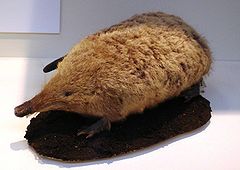| Revision as of 15:08, 7 April 2010 editBruinfan12 (talk | contribs)Autopatrolled, Extended confirmed users12,086 edits link...← Previous edit | Revision as of 06:16, 13 June 2010 edit undoEmausBot (talk | contribs)Bots, Template editors2,855,308 editsm robot Adding: tt:CofarNext edit → | ||
| Line 64: | Line 64: | ||
| ] | ] | ||
| ] | ] | ||
| ] | |||
| ] | ] | ||
| ] | ] | ||
Revision as of 06:16, 13 June 2010
| Russian Desman | |
|---|---|

| |
| Conservation status | |
 Vulnerable (IUCN 3.1) | |
| Scientific classification | |
| Kingdom: | Animalia |
| Phylum: | Chordata |
| Class: | Mammalia |
| Order: | Soricomorpha |
| Family: | Talpidae |
| Subfamily: | Talpinae |
| Tribe: | Desmanini |
| Genus: | Desmana Güldenstädt, 1777 |
| Species: | D. moschata |
| Binomial name | |
| Desmana moschata (Linnaeus, 1758) | |
The Russian Desman (Desmana moschata) (Template:Lang-ru) is a small semi-aquatic mammal that inhabits the Volga, Don and Ural River basins in Russia, Ukraine and Kazakhstan. It constructs burrows into the banks of ponds and slow moving streams, but prefers small, overgrown ponds with abundance of insects and amphibians. The Russian Desman often lives in small (usually non-kin related) groups of 2 to 5 animals and appears to have a complex (but largely unstudied) communication and social system.
The Russian Desman is the only species of the genus Desmana. Despite its outward similarity to muskrats (a rodent), the Russian Desman is actually part of the mole family Talpidae in the order Soricomorpha. Like other moles, it is functionally blind and obtains much of its sensory input from the touch sensitive Eimer's organs at the end of its long, bi-lobed snout. However, the hind feet are webbed and the tail laterally flatened—specializations for its aquatic habitat. The body is 18 to 21 cm long while the tail 17 to 20 cm in length. Easily the largest species of mole, it weigh 400 to 520 g.
Decidedly rich and thick in nature, desman fur used to be highly sought after by the fur trade. Consequently, the Russian Desman is now a protected species under Russian law. Unfortunately, due to loss of habitat (farming), pollution, illegal fishing nets, and the introduction of non-native species (e.g. muskrat), population levels continue to decline. In the mid-1970s, there were an estimated 70,000 desmans in the wild; by 2004 the figure was only 35,000. Fortunately, at least in some Russian regions, the number of desmans appears to be increasing.
References
- Hutterer, R. (2005). Wilson, D.E.; Reeder, D.M. (eds.). Mammal Species of the World: A Taxonomic and Geographic Reference (3rd ed.). Johns Hopkins University Press. p. 303. ISBN 978-0-8018-8221-0. OCLC 62265494.
- Template:IUCN2006 Listed as Vulnerable (VU B1+2c v2.3)
External links
- ARKive - images and movies of the Russian desman (Desmana moschata)
- June 9, 2006, BBC, Campaign to save the Russian desman
